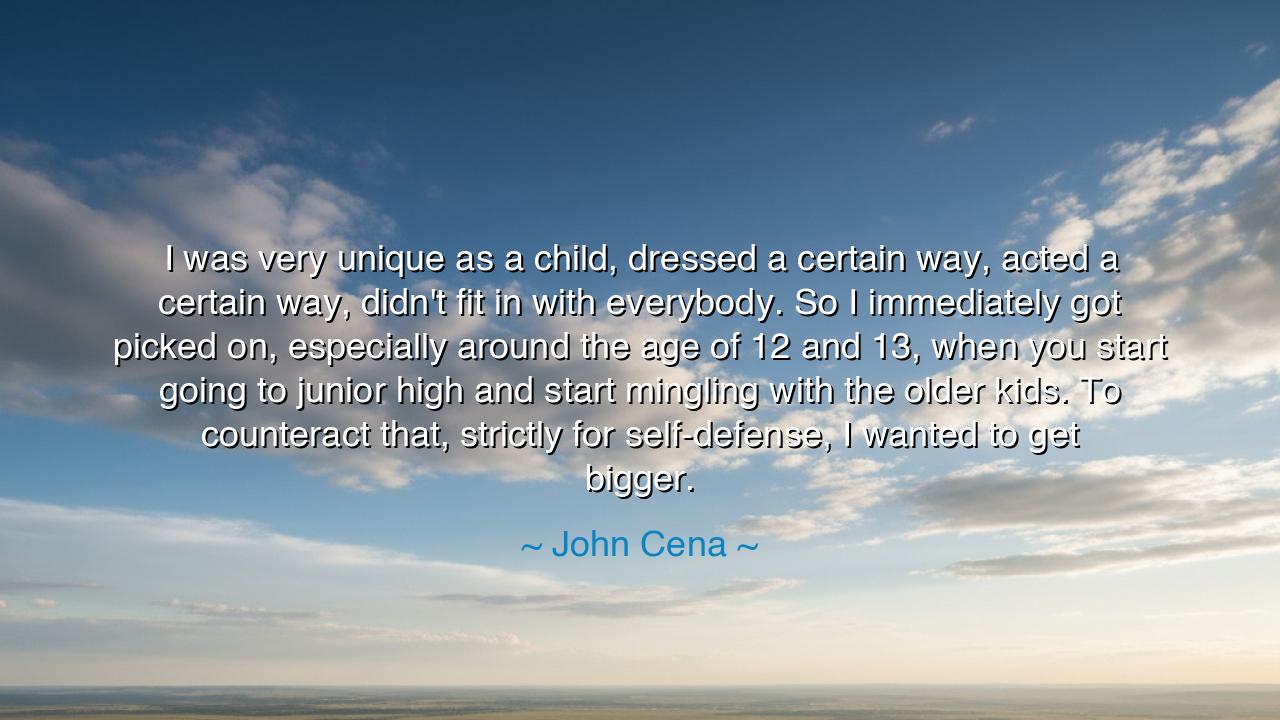
I was very unique as a child, dressed a certain way, acted a
I was very unique as a child, dressed a certain way, acted a certain way, didn't fit in with everybody. So I immediately got picked on, especially around the age of 12 and 13, when you start going to junior high and start mingling with the older kids. To counteract that, strictly for self-defense, I wanted to get bigger.






"I was very unique as a child, dressed a certain way, acted a certain way, didn't fit in with everybody. So I immediately got picked on, especially around the age of 12 and 13, when you start going to junior high and start mingling with the older kids. To counteract that, strictly for self-defense, I wanted to get bigger." These words, spoken by the renowned John Cena, echo with the timeless struggle that all individuals face at some point in their lives: the battle for identity and self-preservation. Cena speaks of his childhood, a time when his unique qualities made him stand out, but also made him vulnerable to the insecurities and hostility of others. In the process, he made the powerful decision to transform himself, not just physically, but in how he carried himself in the world. His words resonate with a universal truth: when we feel different, when we feel vulnerable, we often take action to protect ourselves, to build strength not only in our bodies but in our spirits.
In ancient times, warriors faced similar challenges. Consider the Spartan youth, who were raised in the harshest of conditions to become warriors. They were trained to face both physical and psychological adversity from a young age. Spartans were often ridiculed by their peers, and yet, they chose to embrace their struggle, turning it into strength. The Spartan ideal was to endure hardship and to grow stronger for it, and Cena’s journey echoes this ancient tradition. Just as the Spartans honed their bodies and minds for battle, Cena, in his youth, chose to build his physical and mental strength as a form of self-defense—a means of empowerment in a world that sought to diminish him.
This desire to get bigger, as Cena calls it, is not merely about the body; it is about taking control of one's own narrative. Achilles, in the Iliad, was not only a man of great strength but of great resolve. His strength was an extension of his unyielding will to protect his honor, his friends, and his identity. Just as Achilles sought glory and protection for his people through strength, Cena’s pursuit of physical growth was a way for him to fight against the forces that sought to break his spirit. The desire to grow and become stronger is often a response to external pressures, a means of asserting one’s power and control over one’s destiny.
However, Cena's journey is also a reminder that strength does not come from physical prowess alone. The true power he speaks of is found in the will to overcome adversity, in the resolve to stand firm even when the world seems determined to push us down. This is the lesson we see in the story of David and Goliath, an ancient tale of the underdog prevailing against overwhelming odds. David, a young boy who was underestimated by everyone around him, defeated the giant Goliath not with the strength of a seasoned warrior, but with confidence and courage. Cena’s journey, much like David’s, illustrates that it is not just the physical strength that counts, but the strength of character, the self-belief that allows us to face the trials that others may perceive as insurmountable.
In modern terms, Cena's decision to get bigger—both in body and spirit—speaks to the importance of personal growth in the face of adversity. It is an ancient lesson, one that has been passed down through the ages: when the world attacks or when we feel marginalized, we must grow, not to overpower others, but to protect and empower ourselves. The growth Cena speaks of is a transformation that comes from within, a personal choice to improve and to protect our most vulnerable selves from external forces. It is not about escaping the challenges we face, but about facing them head-on with the strength we cultivate over time.
The lesson for us is clear: we all face moments in life where we feel different, where we feel targeted or vulnerable. It is in those moments that we must take charge, not through aggression or retaliation, but through growth—growth in body, mind, and spirit. Just as Cena chose to strengthen himself in response to the challenges of his youth, so too can we choose to grow in the face of hardship. Whether through physical training, the development of new skills, or the cultivation of inner strength, the key to overcoming adversity lies in our ability to transform our weaknesses into empowerment.
In practical terms, this means taking steps, however small, to improve ourselves, to build strength in areas where we feel vulnerable. It might mean cultivating confidence, learning new skills, or simply taking care of our bodies. The growth Cena describes is not merely about physical transformation, but about the way we respond to the world around us. It is about choosing to rise above the challenges, not by avoiding them, but by confronting them with the strength that comes from within. By doing so, we honor the ancient wisdom that teaches us that true strength lies in our ability to adapt, grow, and overcome.






AAdministratorAdministrator
Welcome, honored guests. Please leave a comment, we will respond soon